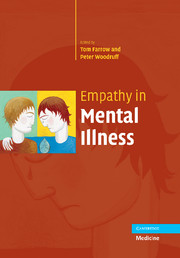Crossref Citations
This Book has been
cited by the following publications. This list is generated based on data provided by Crossref.
2008.
Recent and Relevant.
Journal of the International Neuropsychological Society,
Vol. 14,
Issue. 6,
p.
1099.
Decety, Jean
and
Batson, C. Daniel
2009.
The Moral Brain.
p.
109.
Rameson, Lian T.
and
Lieberman, Matthew D.
2009.
Empathy: A Social Cognitive Neuroscience Approach.
Social and Personality Psychology Compass,
Vol. 3,
Issue. 1,
p.
94.
Decety, Jean
and
Lamm, Claus
2009.
Handbook of Neuroscience for the Behavioral Sciences.
THROOP, C. JASON
2010.
Latitudes of loss: On the vicissitudes of empathy.
American Ethnologist,
Vol. 37,
Issue. 4,
p.
771.
Harris, James C.
2010.
Cognitive Disability and Its Challenge to Moral Philosophy.
p.
55.
Balconi, Michela
and
Bortolotti, Adriana
2012.
Empathy in Cooperative Versus Non-cooperative Situations: The Contribution of Self-Report Measures and Autonomic Responses.
Applied Psychophysiology and Biofeedback,
Vol. 37,
Issue. 3,
p.
161.
Hollan, Douglas
2012.
Emerging Issues in the Cross-Cultural Study of Empathy.
Emotion Review,
Vol. 4,
Issue. 1,
p.
70.
Rameson, Lian T.
Morelli, Sylvia A.
and
Lieberman, Matthew D.
2012.
The Neural Correlates of Empathy: Experience, Automaticity, and Prosocial Behavior.
Journal of Cognitive Neuroscience,
Vol. 24,
Issue. 1,
p.
235.
Balconi, Michela
and
Bortolotti, Adriana
2013.
Emotional face recognition, empathic trait (BEES), and cortical contribution in response to positive and negative cues. The effect of rTMS on dorsal medial prefrontal cortex.
Cognitive Neurodynamics,
Vol. 7,
Issue. 1,
p.
13.
Tei, S
Becker, C
Kawada, R
Fujino, J
Jankowski, K F
Sugihara, G
Murai, T
and
Takahashi, H
2014.
Can we predict burnout severity from empathy-related brain activity?.
Translational Psychiatry,
Vol. 4,
Issue. 6,
p.
e393.
Balconi, Michela
and
Bortolotti, Adriana
2014.
Self-report, personality and autonomic system modulation in response to empathic conflictual versus non conflictual situation.
Cognition and Emotion,
Vol. 28,
Issue. 1,
p.
153.
Milovanović, Radmila
and
Marinković, Teodora
2014.
Emphatic Competences of Future Helpers.
Procedia - Social and Behavioral Sciences,
Vol. 128,
Issue. ,
p.
66.
Vitale, Jonathan
Williams, Mary-Anne
and
Johnston, Benjamin
2014.
Social Robotics.
Vol. 8755,
Issue. ,
p.
350.
Decety, Jean
and
Fotopoulou, Aikaterini
2015.
Why empathy has a beneficial impact on others in medicine: unifying theories.
Frontiers in Behavioral Neuroscience,
Vol. 8,
Issue. ,
Lobmaier, Janek
and
Fischer, Martin
2015.
Facial Feedback Affects Perceived Intensity but Not Quality of Emotional Expressions.
Brain Sciences,
Vol. 5,
Issue. 3,
p.
357.
Bubandt, Nils
and
Willerslev, Rane
2015.
The Dark Side of Empathy: Mimesis, Deception, and the Magic of Alterity.
Comparative Studies in Society and History,
Vol. 57,
Issue. 1,
p.
5.
Leonidaki, Venetia
Lemma, Alessandra
and
Hobbis, Imogen
2016.
Clients’ experiences of dynamic interpersonal therapy (DIT): opportunities and challenges for brief, manualised psychodynamic therapy in the NHS.
Psychoanalytic Psychotherapy,
Vol. 30,
Issue. 1,
p.
42.
Kariagina, T.D.
and
Ivanova, A.V.
2017.
Empathy as an Ability: Structure and Development during Training in Psychological Counseling.
Journal of Russian & East European Psychology,
Vol. 54,
Issue. 6,
p.
470.
Gunawan, I Made Sonny
Wibowo, Mungin E.
Purwanto, Edy
and
Sunawan, Sunawan
2019.
Group Counseling of Values Clarification to Increase Middle School Students’ Empathy.
Psicología Educativa,
Vol. 25,
Issue. 2,
p.
169.



